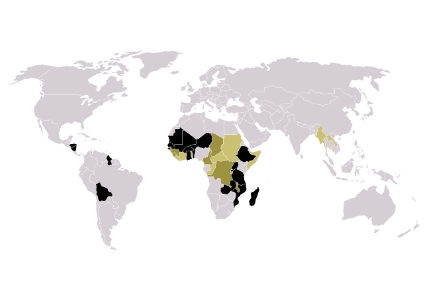Polling

Suggest an important issue not listed in this sub-category (). (Maximum 60 Characters)
Heavily indebted poor countries

More than 2 billion people inhabit the 39 developing countries that are heavily indebted to other nations. These heavily indebted poor countries (HIPC) pay about $3 billion each year to service their debt, some of which was acquired during the Cold War by corrupt regimes. These debt payments greatly reduce the availability of funding for urgent human services needed by the citizens of these countries. Beginning in 1996, industrialized donor countries began cancelling some of this debt through programs such as the HIPC Initiative. To qualify, countries must be facing an unsustainable debt burden which cannot be managed with traditional means. About 36 of the 39 HIPC nations are in this program. However, this assistance is conditional on the governments of these countries meeting a range of economic management and performance targets.
Critics claim these conditions often undermine poverty-reduction efforts by imposing significant financial burdens on their populations. For example, privatizing utilities tend to raise the cost of services beyond the ability of many citizens to pay. Critics claim the HIPC Initiative is a program designed by creditors to protect creditor interests, leaving countries with unsustainable debt burdens even after intervention. They say the International Monetary Fund and the International Bank for Reconstruction and Development (World Bank) have sufficient resources to easily cancel the debts owed to these institutions by heavily indebted poor countries.
Proposed Legislation: H.R.643 - Debt Cancellation for the New Millennium Act (108th Congress, 2003-2004)
Prospective Sponsor: Rep. Maxine Waters (CA)
Critics claim these conditions often undermine poverty-reduction efforts by imposing significant financial burdens on their populations. For example, privatizing utilities tend to raise the cost of services beyond the ability of many citizens to pay. Critics claim the HIPC Initiative is a program designed by creditors to protect creditor interests, leaving countries with unsustainable debt burdens even after intervention. They say the International Monetary Fund and the International Bank for Reconstruction and Development (World Bank) have sufficient resources to easily cancel the debts owed to these institutions by heavily indebted poor countries.
Proposed Legislation: H.R.643 - Debt Cancellation for the New Millennium Act (108th Congress, 2003-2004)
Prospective Sponsor: Rep. Maxine Waters (CA)
Poll Opening Date
June 7, 2021
Poll Closing Date
June 13, 2021
Democracy Rules respects the privacy of your information.
See PRIVACY STATEMENT
See PRIVACY STATEMENT